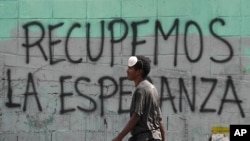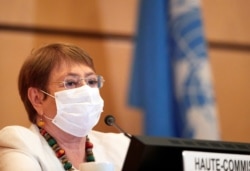United Nations High Commissioner for human rights Michelle Bachelet warns Venezuela’s social and economic crisis will not go away until its profound political standoff is resolved through government negotiations with political opponents. Bachelet presented her latest update on the human rights situation in Venezuela Thursday to the U.N. Human Rights Council in Geneva.
U.N. agencies report more than four million Venezuelans have fled poverty, hunger, human rights violations and political persecution in recent years. The situation has created the largest recorded refugee and migration crisis in the Americas. Most have sought refuge in countries in Latin America.
Bachelet told the U.N. rights council that conditions in Venezuela remain grim.
“People in Venezuela continue to suffer grave violations of economic and social rights due to low salaries, high food prices, persisting deficiencies in public services such as electricity, water and fuel shortages, as well as precarious access to health care. The crisis has been exacerbated by the increase in sectoral sanctions and the COVID-19 pandemic,” she said.
Bachelet criticized U.S. economic sanctions on the government of Nicolas Maduro for intensifying the suffering of millions of Venezuelans.
The U.S. sanctions include the freezing of individual accounts and assets; prohibiting individuals, companies and countries from doing business with the Venezuelan government; seizing of assets, arms embargoes and travel bans.
In August, U.S. President Donald Trump imposed new economic sanctions targeting Venezuela’s petroleum, gold, mining, food and banking industries.
In a letter to the U.S. Congress, Trump explained that he had imposed the new measures “in light of the continued usurpation of power by Nicolas Maduro and persons affiliated with him, as well as human rights abuses, arbitrary arrest and detention of Venezuelan citizens.”
The Venezuelan ambassador to the U.N. in Geneva, Jorge Valero, lambastes the new measures imposed by the Trump administration. Speaking via video link, he blamed them for causing pain, death, and suffering of the Venezuelan people.
“We see the continuation of the seizure of Venezuela's assets abroad, the freezing and pillaging of billions of dollars in foreign banks, which deny the Venezuelan state the resources it needs to acquire food, medicine and medical inputs abroad,” Valero said.
The report presented by the Bachelet documents restrictions to the civic and democratic space in Venezuela. It says the government continues to violate freedom of expression and to detain political leaders, journalists and people protesting for public services.
She also expressed concern about what she called a pattern of arbitrary detentions and violations, including allegations of torture and enforced disappearances by security forces.





